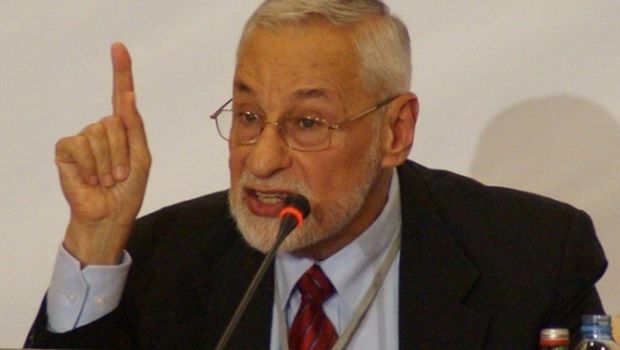It is deeply regretful that the former general guide of the Syrian branch of the Muslim Brotherhood, Ali Sadreddine Al-Bayanuni, has resigned from the Syrian National Coalition. Bayanuni left in protest over the letter sent by the leader of the Coalition, Ahmed Al-Jarba, to newly elected Egyptian President Abdel-Fattah El-Sisi, congratulating the former army chief on his appointment. But there is also an indirect reason for the resignation, relating to his opposition to some of the Coalition’s policies. “In my opinion, the Coalition no longer expresses our people’s hopes and aspirations in achieving the goals of their glorious revolution,” Bayanuni said in a statement earlier this week. This means that Jarba’s congratulatory letter was merely the catalyst that triggered his decision to resign.
Although Byanuni is often described as one of the Coalition’s “patriotic figures,” his position contradicts the statement which the Brotherhood issued in protest against the very same letter. Like Bayanuni, they also said they objected to the Coalition’s policies in several areas—but fortunately did not go as far as to announce their withdrawal. With the Syrian people facing a catastrophe that threatens their homeland and revolution, it would be absolutely wrong for the opposition to move toward any further fragmentation.
These events are a sign that we need to pay more attention to the reality of the Coalition, its policies, and its relations with other opposition blocs and figures. The Brotherhood has been an active participant in the Coalition’s activities since the latter’s establishment. The role of the Islamist group continued to grow until it became the most significant and prominent group in the Syrian opposition. Despite the problems it has encountered and the mistakes it has made, the Coalition still includes representatives of the majority of the intellectual and political currents in Syria, the popular uprising, local councils, and the Free Syrian Army. This is not to mention a number of other patriotic figures who are members in the Coalition. The Coalition also enjoys a degree of international recognition no other Syrian opposition group can wield.
Jarba’s letter was both a matter of diplomatic protocol and a political gesture. In addition to congratulating the Egyptian president and Egyptian people on the elections—which Jarba said represented a step towards stability and prosperity for Egypt—the Coalition’s leader also alluded to the historical and current ties between the two peoples, ties which prompted many Syrians to flee to Egypt to escape the killing, displacement and destruction perpetrated by the Assad regime. Jarba concluded his letter by expressing hope that the new Egyptian government and the Syrian opposition could together “consolidate relations between the two countries and peoples,” adding that Egypt would play “an effective role in helping the Syrian people attain their goals of peace, freedom, justice and equality.”
The letter did not express Jarba’s personal position; rather, its content was in line with the Coalition’s policies regarding its political ties both inside and outside Syria. As the president of the Coalition, Jarba is tasked with implementing, expressing and augmenting these policies. It is only natural that some of these policies would not find favor with every single member of the Coalition. In fact, during a Coalition meeting, the letter was discussed and read out without any of the attendees, including the Brotherhood, raising any objections.
As for the content of the letter, there are two facts that must be considered: first, Egypt is the largest country in the Arab world and home to the headquarters of both the Arab League and the Syrian National Coalition itself; second, there are more than a quarter of a million Syrian refugees and residents currently living in Egypt who need the government’s care and attention, particularly after some of the negative incidents which took place last year. This, of course, means that the Coalition is required to maintain good relations with the Egyptian government and to coordinate with it at the highest levels. As a consequence, the Coalition cannot overlook key developments in Egypt that affect the Syrian cause, the Syrian people, and the presence of the Coalition there.
And, moreover, the letter—which the Syrian branch of the Brotherhood contends expresses negative sentiments about its Egyptian branch—should not be viewed in isolation from what the Coalition and its president have done to normalize the presence of the Islamist group within the Syrian opposition. Consolidating the role of the Brotherhood in the Coalition is an expression of the democratic and inclusive values which the Syrian opposition has been promoting for years. The Brotherhood has been at the forefront of this opposition and, naturally, the Coalition. Even when attacks against the Brotherhood in other Arab countries intensified, the Coalition’s official delegations always included members of the Islamist group—this was the case during the Arab League Summit in Kuwait. This position comes within the framework of the Coalition’s rejection of the marginalization of the Syrian Brotherhood, and its insistence on the group being present and playing an influential role alongside the other opposition blocs within the Coalition itself.
This concept of sharing and partnership means that the Coalition is committed to the formulation of political practices that take the general interests of the Syrian people, their revolution, and the majority of the opposition into account. We should understand that groups and individuals have the right to express different opinions and object to certain positions and practices. But this should take place under the roof of the Coalition which, having emerged as the representative of the Syrian people, should remain the united force of the Syrian opposition.
It is, then, high time for the Syrian opposition to break the habit of focusing on negative details while neglecting the main strategies and issues key to the future of the Syrian cause. These issues are without doubt much more significant than the desires and interests of individuals and organizations.
